深圳新版 上海牛津 七年级下册 英语U7-8
- 格式:doc
- 大小:5.94 MB
- 文档页数:24
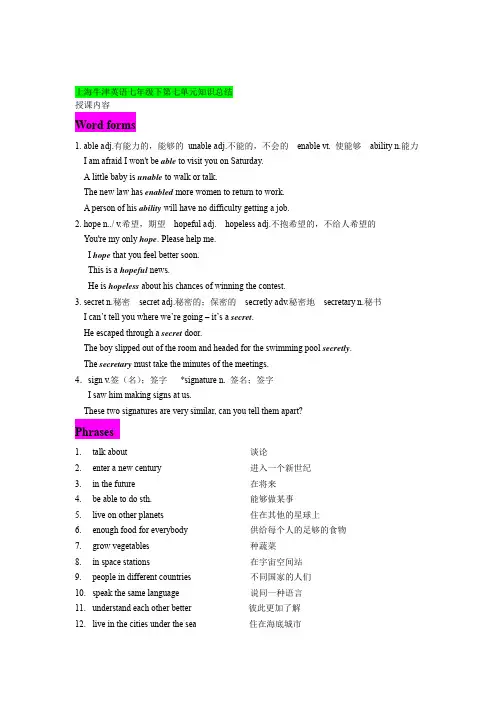
上海牛津英语七年级下第七单元知识总结授课内容Word forms1. able adj.有能力的,能够的unable adj.不能的,不会的enable vt. 使能够ability n.能力I am afraid I won't be able to visit you on Saturday.A little baby is unable to walk or talk.The new law has enabled more women to return to work.A person of his ability will have no difficulty getting a job.2. hope n../v.希望,期望hopeful adj. hopeless adj.不抱希望的,不给人希望的You're my only hope. Please help me.I hope that you feel better soon.This is a hopeful news.He is hopeless about his chances of winning the contest.3. secret n.秘密secret adj.秘密的;保密的secretly adv.秘密地secretary n.秘书I can’t tell you where we’re going –it’s a secret.He escaped through a secret door.The boy slipped out of the room and headed for the swimming pool secretly.The secretary must take the minutes of the meetings.4.sign v.签(名);签字*signature n.签名;签字I saw him making signs at us.These two signatures are very similar, can you tell them apart?Phrases1.talk about 谈论2.enter a new century 进入一个新世纪3.in the future 在将来4.be able to do sth. 能够做某事5.live on other planets 住在其他的星球上6.enough food for everybody 供给每个人的足够的食物7.grow vegetables 种蔬菜8.in space stations 在宇宙空间站9.people in different countries 不同国家的人们10.speak the same language 说同一种语言11.understand each other better 彼此更加了解12.live in the cities under the sea 住在海底城市13.learn form computers 通过电脑来学习14.take pills for meals 服药片代替吃饭15.travel to other planets in spacecraft 乘宇宙飞船去别的行星旅行16.in people’s homes 在人们的家中17.terrible air pollution 严重的大气污染18.in ten years’ time = in ten years在十年以后19.keep sth. in a secret place 把某物存放在一个秘密的地方20.write down … on … 在……上写下……21.pieces of paper 一张张的纸22.put … in … 把……放在……里23.seal sth. with tape 用胶带密封某物24.pollute the earth 污染地球25.become an astronaut 成为一个宇航员Sentences1. What do you think will happen in the future? 你们认为将来会发生什么?2.Perhaps people will be able to do sth. 可能人们将能够做某事。
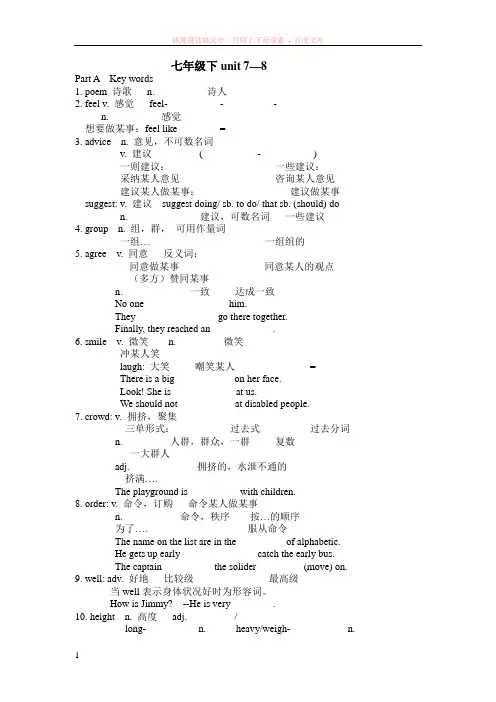
七年级下unit 7—8Part A Key words1. poem 诗歌n. __________诗人2. feel v. 感觉feel- __________-__________-____________n. _________ 感觉想要做某事:feel like ________= _______________3. advice n. 意见,不可数名词v. 建议_________ (___________- __________)一则建议:_________________ 一些建议:________________采纳某人意见_________________ 咨询某人意见________________建议某人做某事:_________________ 建议做某事________________ suggest: v. 建议suggest doing/ sb. to do/ that sb. (should) don. ______________建议,可数名词一些建议__________________ 4. group n. 组,群,可用作量词一组…_________________ 一组组的________________5. agree v. 同意反义词:____________同意做某事_______________ 同意某人的观点_____________(多方)赞同某事_______________n. _____________一致达成一致___________________No one ________ ________him.They ________ _______ go there together.Finally, they reached an ____________.6. smile v. 微笑n. _________微笑冲某人笑_____________laugh: 大笑嘲笑某人______________= _____________There is a big ___________ on her face.Look! She is ____________ at us.We should not ___________at disabled people.7. crowd: v. 拥挤,聚集三单形式:________ 过去式________ 过去分词_________n. _________人群,群众,一群复数_________一大群人________________adj. ____________ 拥挤的,水泄不通的挤满…._______________The playground is __________with children.8. order: v. 命令,订购命令某人做某事______________n. __________ 命令,秩序按…的顺序_______________为了…._______________ 服从命令_______________The name on the list are in the _________ of alphabetic.He gets up early _______________catch the early bus.The captain __________the solider _________(move) on.9. well: adv. 好地比较级__________ 最高级__________当well表示身体状况好时为形容词。
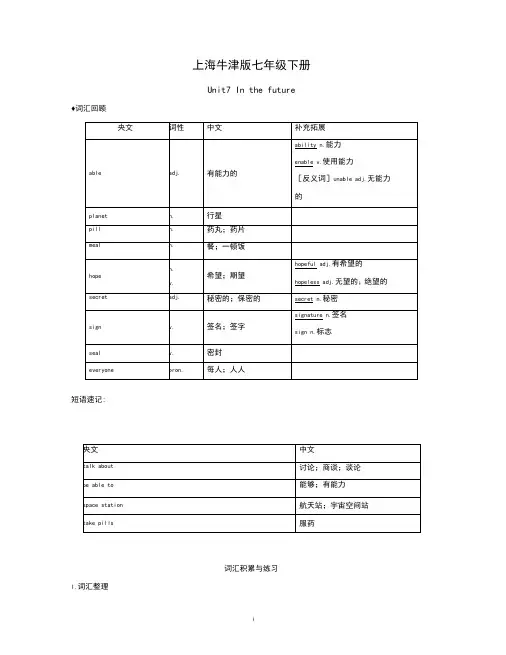
上海牛津版七年级下册Unit7 In the future♦词汇回顾短语速记:词汇积累与练习I.词汇整理i1.able adj.有能力的反义词:unablee.g. She is an able secretary.她是——位能干的秘书。
(be) able to意为能够;有能力",与can意思相近。
f.g. You'll be able to come, won't you?你能来的,对吗?enable v.使…能够做某事g.g. Technology can enable us to live on other planets.注:可以稍给学生强调can和be able to细微区别,can表示能力”时,在很多场合都可以和be able to换用。
但要表示过去经过一番努力才能完成的事情时,只能用be able to。
例如:【正】Can you speak any foreign languages?你会说夕卜语吗?【正】Are you able to speak any foreign languages?你会说夕卜语吗?【正】The fire spread to the whole building quickly but everybody was able to escape. 大火迅速蔓延到整幢大楼,但大家都逃了出来。
【误】The fire spread to the whole building quickly but everybody could escape.2.planet n.行星e. g. The planets move around the sun.行星绕着太阳转。
注:可以让学生回忆之前学过有关星象的单词,star恒星,planet行星,satellite卫星。
3.pill n.药丸;药片e. g. She had to take sleeping pills every night.她每天夜里都得服安眠药。
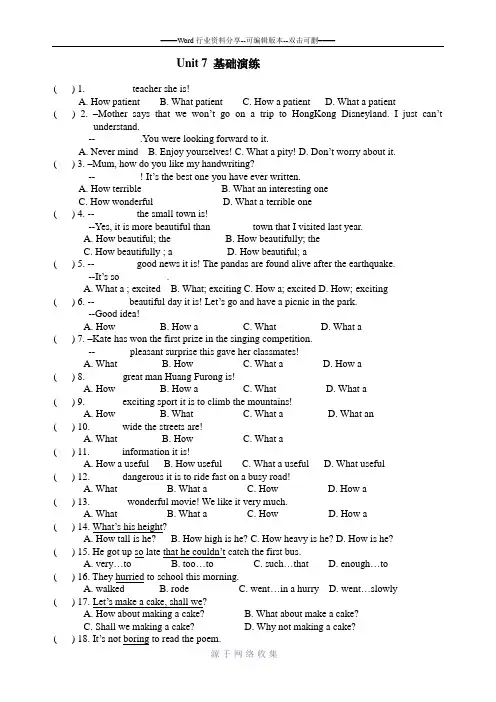
Unit 7 基础演练( ) 1. _________teacher she is!A. How patientB. What patientC. How a patientD. What a patient( ) 2. –Mother says that we won’t go on a trip to HongKong Disneyland. I just can’t understand.--_________.You were looking forward to it.A. Never mindB. Enjoy yourselves!C. What a pity!D. Don’t worry about it.( ) 3. –Mum, how do you like my handwriting?--_________! It’s the best one you have ever written.A. How terribleB. What an interesting oneC. How wonderfulD. What a terrible one( ) 4. --________ the small town is!--Yes, it is more beautiful than ________town that I visited last year.A. How beautiful; theB. How beautifully; theC. How beautifully ; aD. How beautiful; a( ) 5. --________ good news it is! The pandas are found alive after the earthquake.--It’s so _________.A. What a ; excitedB. What; excitingC. How a; excitedD. How; exciting( ) 6. --_______beautiful day it is! Let’s go and have a picnic in the park.--Good idea!A. HowB. How aC. WhatD. What a( ) 7. –Kate has won the first prize in the singing competition.--_______pleasant surprise this gave her classmates!A. WhatB. HowC. What aD. How a( ) 8. _______great man Huang Furong is!A. HowB. How aC. WhatD. What a( ) 9. _______exciting sport it is to climb the mountains!A. HowB. WhatC. What aD. What an( ) 10. ______wide the streets are!A. WhatB. HowC. What a( ) 11. ______information it is!A. How a usefulB. How usefulC. What a usefulD. What useful( ) 12. ______dangerous it is to ride fast on a busy road!A. WhatB. What aC. HowD. How a( ) 13. _______wonderful movie! We like it very much.A. WhatB. What aC. HowD. How a( ) 14. What’s his height?A. How tall is he?B. How high is he?C. How heavy is he?D. How is he?( ) 15. He got up so late that he couldn’t catch the first bus.A. very…toB. too…toC. such…thatD. enough…to( ) 16. They hurried to school this morning.A. walkedB. rodeC. went…in a hurryD. went…slowly( ) 17. Let’s make a cake, shall we?A. How about making a cake?B. What about make a cake?C. Shall we making a cake?D. Why not making a cake?( ) 18. It’s not boring to read the poem.A. excitingB. surprisingC. tiringD. interesting( ) 19. –Are you going to try on this white shirt?--No, I’d like to try on______ blue one.A. aB./C. theD. an( ) 20.-- I’m ________with this uninteresting movie. Can I change for another one?--OK. _______KungFuPanda? It’s a funny movie.A. popular; Why notB. bored; What aboutC. cheerful; Why don’t youD. interested; You’d better( ) 21. This pen is _______ that one. It’s really hard to see the difference.A. similar toB. interested inC. different fromD. good for( ) 22. --_______advice is that? --I think it’s Amy’s.A. WhichB. WhoC. WhoseD. What( ) 23. Did you listen to Obama’s wonderful speech last night? He is a really good_______, I think.A. writerB. teacherC. speakerD. poet( ) 24. –Let’s read the poem together, ________?--OK. I agree _______you.A. will you; withB. shall we; withC. will you; toD. shall we; to( ) 25. –How far is the village from here?--It’s about 2 _______. I advise you to go there on foot.A. minutesB. milesC. minuteD. mile( ) 26. –How lovely the day is! ________? -- Good idea.A. Why not fly kites in the parkB. What’s the weather likeC. What do you think of my ideaD. What can we play outside( ) 27. He felt like ______ when he heard his mother had a bad accident.A. cryB. to cryC. cryingD. cries( ) 28. The boys enter the movie theatre, _______songs. They are very happy.A. singB. singsC. singingD. to sing( ) 29. –You look so tired.--Yes. Can I _______on the sofa to rest for minutes?A. lie downB. stand upC. put downD. give up( ) 30. Mr.Smith sometimes ________business.A. worried aboutB. worries aboutC. worry aboutD.worrying about31. They don’t know ________(she) at all.32. The poem is too long for me ____________(remember).33. His parents gave him some ___________(advice).34. Let’s __________(sing) an English song together.35. Look! Can you see them ___________(fly) kites?36. What’s your __________(high)?37. Don’t __________(speak) Japanese here.38. I’m afraid of hurting his ___________(feel).39. How _________ you are! (luck)40. What deep _________(well) these are!Unit 8 基础演练( ) 1. I still remember the park _______we first met.A. thatB. whichC. whereD. when( ) 2. The English-Chinese dictionary ________my father bought for me many years ago is still of great value.A. whoseB. whenC. whoD. that( ) 3. We should give the boy another chance_______he has made some mistakes.A. thoughB. whenC. unlessD. because( ) 4. –Excuse me, _______can I get to the nearest bookshop?--Go along this road and you will find it on your right.A. whyB. whereC. whenD. how( ) 5. Ten years had passed ______the CCTV event People Who Moved China took place in 2002.A. whenB. whileC. beforeD. since( ) 6. Peter will cook for his parents _______the International Day of Families comes.A. unlessB. whenC. untilD. though( ) 7. He ______go out with his parents, but now he ______staying at home alone.A. used to; is used toB. is used to; used toC. use to; is used to( ) 8. The film made by Walt Disney _______all over the world.A. is used to showB. is used to showingC. used to showD. used to be shown( ) 9. –Is the film interesting?--I thought it would be. But ______,it’s very boring.A. in allB. in factC. in additionD. in future( ) 10. Jeremy Lin ______an unknown basketball player in New York Knicks for quite a long time.A. used to beB. used to beingC. is used to beD. was used to be( ) 11. He used to work in a hospital.A. is workingB. workedC. worksD. will work( ) 12. Liu Qian can turn paper into money.A. change…intoB. go…intoC. come…intoD. fly…into( ) 13. There are more than 2.000 people in the hall.A. aboutB. someC. less thanD. over( ) 14. We often use pens to write.A. We often write with pens.B. We often write having pens.C. We often use pens writingD. We often use pens write( ) 15. I am proud of Shenzhen.A. likeB. loveC. take pride inD. live in( ) 16. My grandpa used _______in the countryside.A. livedB. to liveC. livingD. live( ) 17. She used to take a bus to school. But now she is used _______to school every day.A. walkingB. walkC. to walkD. to walking( ) 18. It’s interesting for us ________the Moon.A. to studyB. studyingC. studyD. studied( ) 19. Summer holiday is ________us. The new term starts.A. beforeB. behindC. forD. in front of( ) 20. This city is one of _______in China.A. the most beautiful oneB. the most beautiful onesC. beautiful onesD. the beautiful one( ) 21. She enjoys ball games, _______football, and tennis.A. such asB. exampleC. asD. as an example ( ) 22. He could speak English _______she was 5.A. whenB. ifC. becauseD. which ( ) 23. Don’t run _______the road. It’s not _______.A. cross; safeB. across; safeC. cross; safelyD. across; safely ( ) 24. Stars _______diamonds at night.A. likeB. lookC. look likeD. like look ( ) 25. He decided _______the pet dog________.A. train; himselfB. to train; himC. training; hisD. to train; himself ( ) 26. ______people are interested in the satellite.A. More and moreB. More or lessC. More and lessD. Less and more ( ) 27. The old man lives ______, but he doesn’t feel_______.A. alone; aloneB. lonely; lonelyC. alone; lonelyD. lonely; alone ( ) 28. The music _______wonderful.A. soundsB. listensC. listens toD. hears ( ) 29. If you want to ______your dream, you have to _______your best.A. getting; doB. achieve; tryC. come true; doD. achieving; try ( ) 30. The meeting _______for 5 hours. It’s time ______supper.A. spent; forB. took; ofC. was; atD. lasted; for31. Would you like to go _________(sail) with us?32. He used _________(live) in the U.S.33. Wood can be used _________(make) many things.34. The young people try their best to achieve their ____________(dream).35. I am proud of _________(be) a Chinese.36. She collects more than 100 cute ________(toy).37. She often buys her father a cake when his birthday __________(come).38. I have many ___________(hobby).39. Don’t run __________(cross) the road. It’s dangerous.40. –Who is on duty today? --__________(my).。
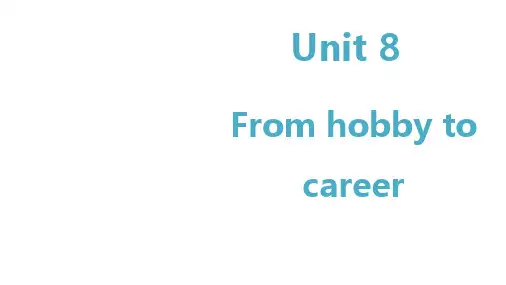
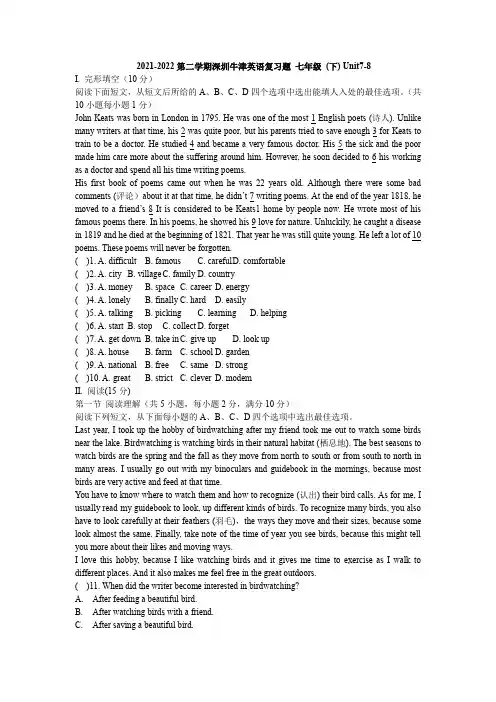
2021-2022第二学期深圳牛津英语复习题七年级(下) Unit7-8I. 完形填空(10分)阅读下面短文,从短文后所给的A、B、C、D四个选项中选出能填人入处的最佳选项。
(共10小題每小題1分)John Keats was born in London in 1795. He was one of the most 1 English poets (诗人). Unlike many writers at that time, his 2 was quite poor, but his parents tried to save enough 3 for Keats to train to be a doctor. He studied 4 and became a very famous doctor. His 5 the sick and the poor made him care more about the suffering around him. However, he soon decided to 6 his working as a doctor and spend all his time writing poems.His first book of poems came out when he was 22 years old. Although there were some bad comments (评论)about it at that time, he didn’t 7 writing poems. At the end of the year 1818, he moved to a friend’s 8 It is considered to be Keats1 home by people now. He wrote most of his famous poems there. In his poems, he showed his 9 love for nature. Unluckily, he caught a disease in 1819 and he died at the beginning of 1821. That year he was still quite young. He left a lot of 10 poems. These poems will never be forgotten.( )1. A. difficult B. famous C. careful D. comfortable( )2. A. city B. village C. family D. country( )3. A. money B. space C. career D. energy( )4. A. lonely B. finally C. hard D. easily( )5. A. talking B. picking C. learning D. helping( )6. A. start B. stop C. collect D. forget( )7. A. get down B. take in C. give up D. look up( )8. A. house B. farm C. school D. garden( )9. A. national B. free C. same D. strong( )10. A. great B. strict C. clever D. modemII. 阅读(15分)第一节阅读理解(共5小题,每小题2分,满分10分)阅读下列短文,从下面每小题的A、B、C、D四个选项中选出最佳选项。
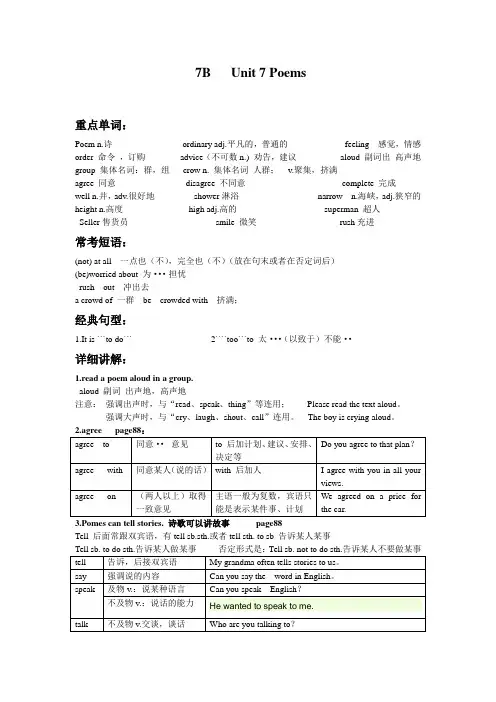
7B Unit 7 Poems重点单词:Poem n.诗ordinary adj.平凡的,普通的feeling 感觉,情感order 命令,订购advice(不可数n.) 劝告,建议aloud 副词出高声地group 集体名词:群,组crow n. 集体名词人群;v.聚集,挤满agree 同意disagree 不同意complete 完成well n.井,adv.很好地shower淋浴narrow n.海峡,adj.狭窄的height n.高度high adj.高的superman 超人Seller售货员smile 微笑rush充进常考短语:(not) at all 一点也(不),完全也(不)(放在句末或者在否定词后)(be)worried about 为···担忧rush out 冲出去a crowd of 一群be crowded with 挤满;经典句型:1.It is ```to do``` 2````too```to 太···(以致于)不能··详细讲解:1.read a poem aloud in a group.aloud 副词出声地,高声地注意:强调出声时,与“read、speak、thing”等连用;Please read the text aloud。
强调大声时,与“cry、laugh、shout、call”连用。
The boy is crying aloud。
2.agree page88:agree to 同意··意见to 后加计划、建议、安排、决定等Do you agree to that plan?agree with 同意某人(说的话)with 后加人I agree with you in all yourviews.agree on (两人以上)取得一致意见主语一般为复数,宾语只能是表示某件事、计划We agreed on a price forthe car.3.Pomes can tell stories. 诗歌可以讲故事page88Tell 后面常跟双宾语,有tell sb.sth.或者tell sth. to sb 告诉某人某事Tell sb. to do sth.告诉某人做某事否定形式是:Tell sb. not to do sth.告诉某人不要做某事tell 告诉,后接双宾语My grandma often tells stories to us。
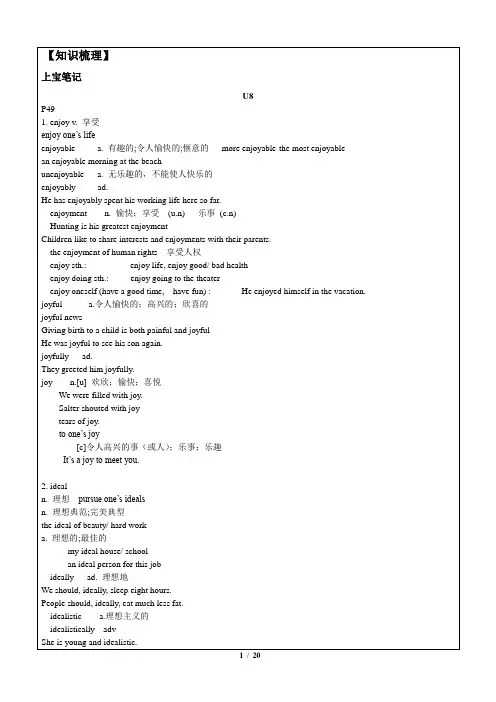
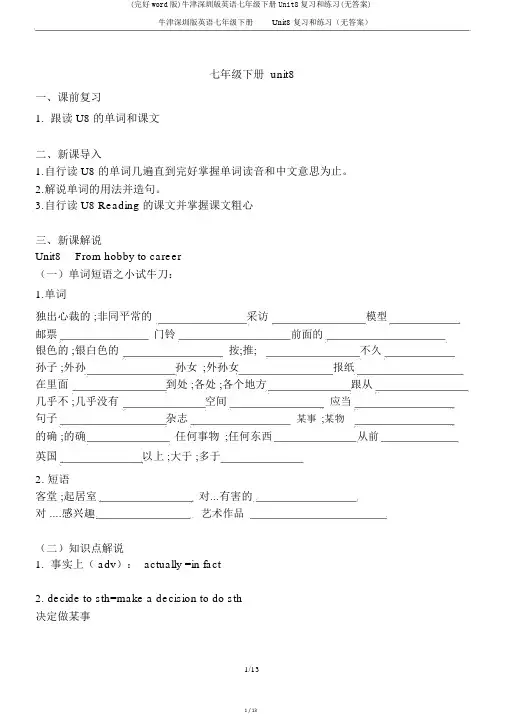
牛津深圳版英语七年级下册Unit8 复习和练习(无答案)七年级下册 unit8一、课前复习1.跟读 U8 的单词和课文二、新课导入1.自行读 U8 的单词几遍直到完好掌握单词读音和中文意思为止。
2.解说单词的用法并造句。
3.自行读 U8 Reading 的课文并掌握课文粗心三、新课解说Unit8 From hobby to career(一)单词短语之小试牛刀:1.单词独出心裁的 ;非同平常的采访模型邮票门铃前面的银色的 ;银白色的按;推;不久孙子 ;外孙孙女;外孙女报纸在里面到处 ;各处 ;各个地方跟从几乎不 ;几乎没有空间应当句子杂志某事;某物的确 ;的确任何事物;任何东西从前英国以上 ;大于 ;多于2. 短语客堂 ;起居室对...有害的对 ....感兴趣艺术作品(二)知识点解说1.事实上( adv): actually =in fact2.decide to sth=make a decision to do sth决定做某事牛津深圳版英语七年级下册Unit8 复习和练习(无答案)3. alone (adv);独自alone与 lonely 的差别:alone 不过陈说一个客观事实,意思是 "独自一人 "、" 没有伙伴或助手 ",只用作表语。
有时放在名词或代词后,表示"不过 "、"只有 " ,可作形容词。
比如:He was alone in the house.他独自一人在房屋里。
此外, alone=by oneself 可用作副词,表示 " 独自地 " 、"独自地 "。
比如:The boy can do it alone. 这男孩能独自做这事。
lonely 则有浓重的感情色彩,指因缺乏朋友、怜悯、友情时所发生的一种伤心的和郁闷的感情,意思是 " 孤单 "、"孤独 " ,作形容词。
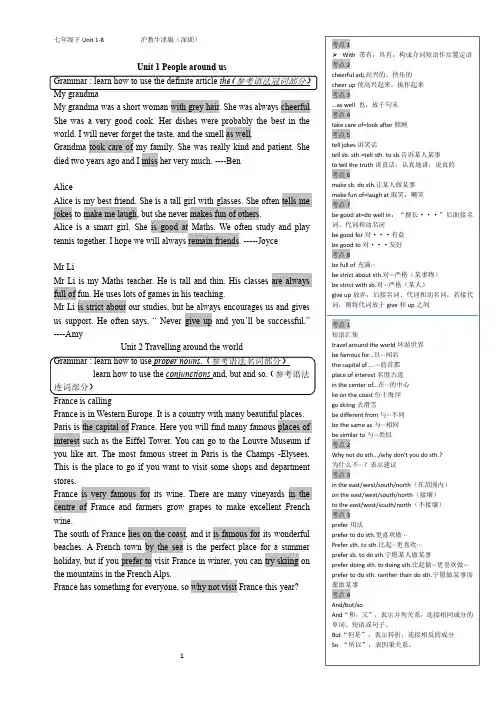
七年级下Unit 1-8沪教牛津版(深圳)Unit 1People around usMy grandma was a short woman with grey hair.She was always cheerful.She was a very good cook.Her dishes were probably the best in the world.I will never forget the taste,and the smell as well.Grandma took care of my family.She was really kind and patient.She died two years ago and I miss her very much.----Ben AliceAlice is my best friend.She is a tall girl with glasses.She often tells me jokes to make me laugh,but she never makes fun of others.Alice is a smart girl.She is good at Maths.We often study and play tennis together.I hope we will always remain friends.-----Joyce Mr LiMr Li is my Maths teacher.He is tall and thin.His classes are always full of fun.He uses lots of games in his teaching.Mr Li is strict about our studies,but he always encourages us and gives us support.He often says,“Never give up and you’ll be successful.”----AmyUnit 2Travelling around the worldFrance is in Western Europe.It is a country with many beautiful places.Paris is the capital of France.Here you will find many famous places of interest such as the Eiffel Tower.You can go to the Louvre Museum if you like art.The most famous street in Paris is the Champs -Elysees.This is the place to go if you want to visit some shops and department stores.France is very famous for its wine.There are many vineyards in the centre of France and farmers grow grapes to make excellent French wine.The south of France lies on the coast,and it is famous for its wonderful beaches.A French town by the sea is the perfect place for a summer holiday,but if you prefer to visit France in winter,you can try skiing on the mountains in the French Alps.France has something for everyone,so why not visit France this year?考点1With 带有,具有,构成介词短语作后置定语考点2cheerful adj.高兴的,快乐的cheer up 使高兴起来,振作起来考点3...as well 也,放于句末考点4take care of=look after 照顾考点5tell jokes 讲笑话tell sb.sth.=tell sth.to sb.告诉某人某事to tell the truth 讲真话,认真地讲,说真的考点6make sb.do sth.让某人做某事make fun of=laugh at 取笑,嘲笑考点7be good at=do well in ,“擅长···”后面接名词、代词和动名词be good for 对···有益be good to 对···友好考点8be full of 充满···be strict about sth.对···严格(某事物)be strict with sb.对···严格(某人)give up 放弃,后接名词、代词和动名词,若接代词,则将代词放于give 和up 之间考点1短语汇集travel around the world 环游世界be famous for...以···闻名the capital of...···的首都place of interest 名胜古迹in the center of...在···的中心lie on the coast 位于海岸go skiing 去滑雪be different from 与···不同be the same as 与···相同be similar to 与···类似考点2Why not do sth.../why don’t you do sth.?为什么不···?表示建议考点3in the east/west/south/north (在范围内)on the east/west/south/north (接壤)to the east/west/south/north (不接壤)考点3prefer 用法prefer to do sth.更喜欢做···Prefer sth.to sth.比起···更喜欢···prefer sb.to do sth.宁愿某人做某事prefer doing sth.to doing sth.比起做···更喜欢做···prefer to do sth.ranther than do sth.宁愿做某事而愿做某事考点4And/but/soAnd “和,又”,表示并列关系,连接相同成分的单词、短语或句子。
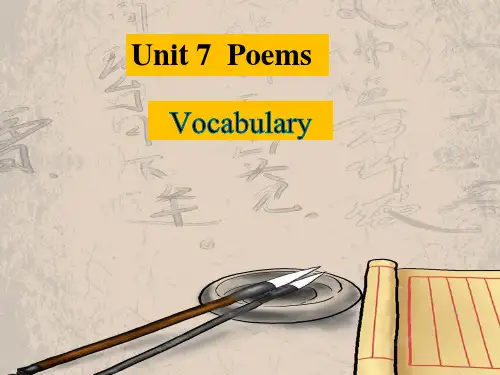
上海牛津版七年级下英语7BU8练习卷一和参考答案七年级(下)英语7BU8练卷一三、用适当的反身代词填空19.I want to know more about you。
Jim。
Tell me about yourself.一、Choose the best answer1.I have lived here since I was born.2.I’m going to organize one more school outing next Friday.3.Hello。
Peter。
Let’s share this cake een ourselves.4.When we have English lessons。
we sit in groups in the classroom.5.Help yourselves to the cake。
Peter and Tom.6.It’s too hot for the students to run in PE lessons in summer.7.Children should learn to do everything themselves.8.There is less snow this winter than last one.9.There are many trees and flowers on both sides of the street.10.He knows everyone in the village。
he has been here for three years.11.May has too much homework。
so she would like to have less homework.12.My ideal is to go to France to study。
which is used differently from the other three ns.13.There are ten female teachers in his school.14.You only spend one hour doing your homework。
牛津沪教版七年级下册英语7-8单元知识点Unit 7 Poems【短语(词组)】1. poem诗歌;poet 诗人;poetry诗歌(总称)2. advice 【不可数名词】搭配:a piece of advice;some advice give sb. some advice 给某人建议3. a crowd of +名词复数:一群,一伙4. agree with sb/sth同意某人的意见,想法,分析,解释;agree to do sth 表示同意做某事【名词】agreement【反义词】disagree;disagreement(名词)5. take a shower 淋浴;take a bath:洗澡6. adj.--n :high—height 高;wide—width 宽; long—length长;deep-depth 深; strong—strength强7. smile at sb:冲某人笑;a big smile 一个大大的微笑8. a crowd of +people 一群人;be crowded with: 挤满了9. not at all 一点也不Water does not have any taste at all. =Water has no taste at all.【表示不客气】--Thank you! --Not at all.10. be worried about = worry about 为…担忧You don't have to worry about him. =You don't have to be worried about him.11. newspaper stand 报摊12. rush out 冲出去13. too...to... 的用法“too+形容词/副词+动词不定式”结构简称为“too...to”结构。
这种结构是英语中常用的一种句型,在大多数情况下表示否定意义,在翻译时,通常可译为:“太……而不能……”、“太……无法……"。
老师姓名学生姓名教材版本深圳新版-上海牛津版学科名称英语年级八上课时间2014-8-2 8:00-10:00 课题名称复习七下U7-8教学重难点单词,短语教学过程Step 1: 情态动词情态动词的定义情态动词是一种本身有一定的词义,表示说话人的情绪、态度或语气的动词,但不能单独作谓语,只能和其他动词原形构成谓语。
We can be there on time tomorrow. 我们明天能按时去那儿。
May I have your name? 我能知道你的名字吗?Shall we begin now? 我们现在就开始吗?You must obey the school rules. 你必须遵守校规。
情态动词数量不多,但用途广泛,主要有下列:can (could), may (might), must, need, ought to, dare (dared), shall (should), will (would) .二.情态动词的位置情态动词在句中放在谓语动词之前,谓语动词前若有助动词,则在助动词之前,疑问句中,情态动词放在主语之前。
I can see you. Come here. 我能看见你,过来吧。
He must have been away. 他一定走了。
What can I do for you? 你要什么?How dare you treat us like that! 你怎么敢那样对待我们!●情态动词的特点①情态动词无人称和数的变化②情态动词后面跟的动词需用原形,否定式构成是在情态动词后面加“not”。
③不能单独充当谓语。
情态动词必须与一个实义动词一起构成复合谓语,并且这个实意动词要始终是动词原形。
④个别情态动词有现在式和过去式两种形式,过去式可以用来表达更加客气、委婉的语气,时态性不强,可用于过去,现在或将来。
⑤变为疑问句时只需将情态动词提到主语的前面。
He could be here soon. 他很快就来。
We can't carry the heavy box. 我们搬不动那箱子。
I'm sorry I can't help you. 对不起,我帮不上你。
四. 考点解读初中阶段必须掌握的情态动词:can, may, must, need, had better, shall, will, should, would, could, might, have to考点一:can, could 的用法:can和could都可以表示能力、技能、许可、建议或请求和可能性。
1.表示能力,意为―能、会‖。
—_____you speak Japanese ?—No, I can’t.A. CanB. MustC. MayD. Should—Have you seen my glasses? I _____find them.—Sorry. I haven’t seen them.A. can’tB. shouldn’tC. won’tD. mustn’t2.表示推测,意为―可能‖,常用在否定句、疑问句中。
常见于对can’t be的考查,意为―不可能‖。
—Is Lucy knocking at the door?—No. It_____be Lucy. She is in Japan now.A. needn’tB. mustC. can’t3. 以can开头的一般疑问句,表示许可或请求,此时可等于may. 其肯定回答和否定回答分别用can和can’t。
但比较委婉客气地提出问题或陈述看法,一般用could,回答时则用can。
例如:You can use this pen.Can I borrow your book?—Could I...?我可以……吗?—Of course you can. 当然可以。
—Could I borrow your dictionary?—Of course you_____.A. canB. mustC. shouldD. will补充:can 和be able to的区别can 只有现在和过去时态(could),表示习惯能力;be able to有各种时态,表示“一时”的能力,即经努力而做成了某事,强调结果。
Mary can play the piano . She has been able to play it since she was 5.Yesterday I was able to get home before the heavy rain.注意:在否定结构中,二者可以互换。
考点二:may/ might的用法1. may/might表示推测时,只能用于陈述句,表示对现在或将来要发生的动作把握不大。
(may>might) 表示否定的推测用may not,意思是―或许不‖It may rain tomorrow .She may be at home.-Why isn’t he in class?He may be sick.(生病的可能性较大)—He might be sick.(生病的可能性较小)—Is Mr. Brown driving here?—I’m not sure. He_____come by train.A. mayB. shallC. needD. must解析:答案为A。
从暗示语I’m not sure.判断说话人没有把握,must意为―一定‖,有把握;need为―需要‖,与题意不符。
故选may,表示推测,意为―可能、也许‖。
Is Susan going to the hometown by train? I guess she _____.I know she likes driving her new car.A. mustn’tB. can’tC. may notJohn ____ come to see us tonight, but he isn’t very sure yet.A. mayB. canC. has to2. 表示希望、祈求、祝愿,常可译为“祝愿”。
通常是用may +主+V例如:May you have a good time.May you be happy!May you succeed!3. may / might 表示建议或请求,但might比may 更客气. 和can 表示的请求相比,may更正式,can口语化。
Yes, you can / may.—May / Might I use your bike? —No, you mustn’t/ can'tJohn, you needn’t do your work today, you_____do it tomorrow if you’re tired.A. mustB. mayC. can’t解析:答案为B。
锁定语境,由暗示语needn’t do...today. 可知―不必今天去做‖。
根据tomorrow 得知可以―明天做‖。
may意为―可以‖;must意为―必须‖,语气太强硬;can’t意为―不能‖,与题意不符。
____I have you name, please? Yes, Smith. S-M-I-T-H.1.Must B. May C. Will考点三:must的用法1.表示责任、义务或一种强制性规定。
意为―必须、应该‖。
否定形式mustn’t表示禁止,意为―不许‖。
You must stay here until I come backYou mustn’t play with fire.You mustn’t be late.—Mum, can I go to the movies today?—Sure, but you_____finish your homework first.A. canB. can’tC. mustD. needn’t解析:答案为C。
根据暗示词but,first看出说话人语气强硬。
can 意为―可以‖,语气不够强硬;can’t意为―不能‖;needn’t意为―没有必要‖,与题意不符。
You ____ wash your hands before meals.A. needB. mustC. canThe traffic _____ stop when the lights are red.A. mustB. mayC. can’t2. 表示推测,用于肯定句中。
意为―一定‖,可能性大。
多见于对must be的考查。
The light is on, so he must be at home now.—Our class won the English speaking contest.—Congratulations! You_____be very proud of it.A. canB. needC. wouldD. must解析:答案为D。
根据句意―我们班赢得了英语演讲比赛‖可知,一定很自豪(proud),must 意为―一定‖,表示推测的可能性大;can be语气强硬些;need意为―需要‖;would为委婉询问,不用于推测。
3. 以must开头的疑问句,肯定回答用must,否定回答常用needn’t,表示―不需要、不必‖,相当于don’t have to。
—Must I finish my homework now? 我必须……吗?—No, you needn’t / don’t have to. 不,你不必。
—Yes, you must. 是的,你必须。
—Must I return the magazine to you right now, Sandy?—No, you_____.You may keep it until next Wednesday.A. needn’tB. can’tC. mustD. may解析:答案为A。
must 的否定回答为needn’t。
注意:must 和have to 的区别:must 表示说话人的主观思想have to ―不得不,必须‖,表示客观需要、客观条件只能如此。
You will have to clean your own boots when you join the army.I have to be at my office every evening.We must rely on ourselves. 我们必须依靠自己。
My brother was badly ill, so I ____________call the doctor in the middle of the night.He said that he ____________ work hard.We ____________trust ourselves .We ____________stay at home because it is raining.考点四needneed表示需要、必须,主要用于否定句和疑问句中,其否定形式为needn’t,意为―没有必要,不必‖。